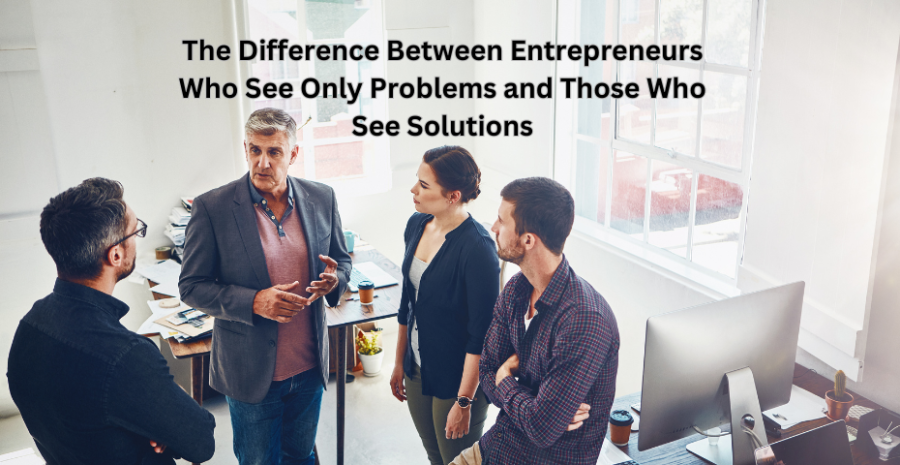
The Difference Between Entrepreneurs Who See Only Problems and Those Who See Solutions

Entrepreneurship is a journey filled with challenges and opportunities. The mindset with which an entrepreneur approaches these challenges can significantly impact their success.
Some entrepreneurs focus primarily on problems, while others concentrate on finding solutions.
Here are ten key differences between these two types of entrepreneurs:
Entrepreneurs who see only problems often have a negative or pessimistic outlook. They focus on what could go wrong, which can lead to inaction or hesitation. In contrast, solution-oriented entrepreneurs maintain a positive and optimistic mindset. They view challenges as opportunities for innovation and growth.
The mindset and attitude of an entrepreneur are fundamental to their approach to business. Entrepreneurs who focus on problems often have a defeatist attitude, viewing obstacles as insurmountable barriers. This negative mindset can lead to a lack of motivation and creativity, stifling progress and innovation.
In contrast, solution-focused entrepreneurs embrace challenges with a positive attitude, seeing them as opportunities to learn and grow. This optimism fuels their drive and inspires those around them, fostering a culture of resilience and continuous improvement.
By maintaining a positive outlook, solution-oriented entrepreneurs are better equipped to navigate the ups and downs of the entrepreneurial journey.

Problem-focused entrepreneurs tend to get bogged down in analysis paralysis. They spend excessive time identifying and dissecting problems without moving forward. Solution-focused entrepreneurs, on the other hand, are decisive. They quickly assess the situation, identify potential solutions, and take action.
The decision-making approach of an entrepreneur significantly influences their business trajectory. Entrepreneurs who focus solely on problems often become immobilized by overanalyzing potential pitfalls, leading to indecision and missed opportunities.
This cautious approach can hinder their ability to act swiftly and capitalize on market trends. In contrast, solution-oriented entrepreneurs are more decisive and action-oriented. They quickly evaluate situations, weigh their options, and implement solutions, understanding that timely decisions are crucial for business momentum.
This proactive stance not only accelerates progress but also instills confidence in their team, fostering a dynamic and forward-thinking organizational culture.
Entrepreneurs who see only problems may become easily discouraged by setbacks. Their focus on obstacles can make them less resilient. Conversely, solution-focused entrepreneurs are more adaptable and resilient. They see setbacks as temporary and are quick to pivot and find new paths forward.
Resilience and adaptability are key traits that distinguish successful entrepreneurs. Those who focus on problems often find themselves overwhelmed by setbacks, viewing them as insurmountable obstacles. This can lead to discouragement and a reluctance to take risks.
Conversely, solution-focused entrepreneurs exhibit remarkable resilience. They view challenges as temporary and are quick to adapt their strategies, learning from each setback and using it as a stepping stone toward success. Their ability to remain flexible and resourceful in the face of adversity not only helps them navigate tough times but also positions them to seize new opportunities as they arise.
.png)
Problem-centric entrepreneurs often get stuck in traditional ways of thinking, limiting their ability to innovate. Solution-focused entrepreneurs, however, thrive on creativity. They think outside the box and are constantly looking for new and better ways to address challenges.
Innovation and creativity are vital for entrepreneurial success, and these qualities are often shaped by an entrepreneur's focus. Entrepreneurs who see only problems tend to stick to conventional methods, limiting their capacity for innovation. Their preoccupation with obstacles stifles creative thinking and prevents them from exploring new possibilities.
In contrast, solution-focused entrepreneurs thrive on innovation and creativity. They actively seek novel approaches and are willing to experiment, taking calculated risks to develop unique solutions. This openness to creativity not only drives their businesses forward but also sets them apart in competitive markets, fostering a culture of continuous improvement and ingenuity.
Leaders who focus on problems can create a negative work environment, leading to low team morale. In contrast, leaders who emphasize solutions inspire and motivate their teams. They foster a culture of positivity and collaboration, encouraging everyone to contribute to problem-solving efforts.
Team motivation and leadership are profoundly impacted by an entrepreneur's outlook. Problem-focused entrepreneurs often create a negative atmosphere, where constant attention to issues and obstacles can demoralize team members and reduce overall productivity.
This environment can stifle innovation and lead to high turnover rates. On the other hand, solution-oriented entrepreneurs inspire and motivate their teams by emphasizing possibilities and progress. They lead by example, fostering a positive and collaborative culture where challenges are seen as collective opportunities for growth.
This approach not only boosts morale but also encourages team members to contribute their best ideas and efforts, driving the organization toward success.

Problem-focused entrepreneurs may struggle to build strong customer relationships because they are more likely to dwell on issues and complaints. Solution-oriented entrepreneurs prioritize customer satisfaction. They actively seek feedback and work to address customer needs and concerns proactively.
Customer relationships are a crucial aspect of entrepreneurial success, heavily influenced by the entrepreneur's perspective. Entrepreneurs who see only problems often focus on customer complaints and issues, which can lead to strained relationships and a reactive approach to customer service.
This can result in decreased customer satisfaction and loyalty. In contrast, solution-focused entrepreneurs prioritize proactive engagement with customers, seeking feedback and continuously working to improve their offerings.
They view customer challenges as opportunities to enhance their products and services, fostering strong, trust-based relationships. This proactive approach not only increases customer satisfaction but also builds a loyal customer base that can advocate for the business.
Entrepreneurs who see only problems are often risk-averse. Their fear of potential issues can prevent them from taking necessary risks. Solution-focused entrepreneurs are more comfortable with calculated risks. They understand that taking risks is essential for growth and innovation.
Risk management is a critical component of entrepreneurship, significantly influenced by an entrepreneur's focus. Problem-centric entrepreneurs often exhibit a risk-averse mentality, fearing potential failures and avoiding decisions that might expose them to uncertainty.
This cautious approach can limit innovation and growth opportunities. In contrast, solution-focused entrepreneurs embrace calculated risks as essential for progress. They analyze potential downsides but remain undeterred, leveraging their creativity and resilience to mitigate risks and capitalize on new opportunities.
This balanced approach to risk management not only drives innovation but also equips them to handle unforeseen challenges, ensuring sustained growth and adaptability in a dynamic market.

Problem-centric entrepreneurs often set vague or overly cautious goals. Their fear of failure can limit their ambition. Solution-oriented entrepreneurs set clear, ambitious goals and develop actionable plans to achieve them. They are driven by a vision of success rather than fear of failure.
Goal setting and achievement are deeply influenced by an entrepreneur's perspective. Entrepreneurs who focus on problems often set vague or overly cautious goals, driven by a fear of failure. This conservative approach can limit their potential and stifle growth.
Conversely, solution-oriented entrepreneurs set clear, ambitious goals that inspire and challenge them. They create actionable plans and remain focused on their objectives, viewing obstacles as temporary setbacks rather than insurmountable barriers. This forward-thinking mindset not only propels them toward their goals but also fosters a culture of continuous improvement and high performance, driving sustained success and innovation.
Entrepreneurs focused on problems may struggle to utilize resources effectively, as they are often preoccupied with what they lack. Solution-focused entrepreneurs maximize the resources at their disposal. They are resourceful and find creative ways to leverage their assets to overcome challenges.
Resource utilization is a critical factor in entrepreneurial success, shaped by how entrepreneurs perceive challenges. Problem-focused entrepreneurs often fixate on what they lack, leading to underutilization of available resources and missed opportunities.
This scarcity mindset can hinder growth and innovation. In contrast, solution-oriented entrepreneurs adopt a resourceful approach, leveraging every asset at their disposal creatively and efficiently. They maximize their resources, finding innovative ways to achieve their goals despite limitations.
This ability to make the most of what they have not only drives their business forward but also fosters a culture of ingenuity and resilience, positioning them for long-term success.

Ultimately, the difference in mindset can significantly impact long-term success. Entrepreneurs who focus on problems may find themselves stuck and unable to scale their businesses. Those who concentrate on solutions are more likely to experience sustained growth and success. Their positive, proactive approach enables them to navigate challenges and seize opportunities effectively.
Long-term success in entrepreneurship hinges on the entrepreneur's mindset and strategic approach. Entrepreneurs who focus solely on problems may struggle to sustain growth and innovation over time. Their reactive mindset can lead to missed opportunities and a lack of adaptability in a rapidly changing market.
In contrast, solution-oriented entrepreneurs are proactive and forward-thinking. They continuously innovate, anticipate market shifts, and pivot their strategies when necessary.
This proactive approach not only allows them to navigate challenges effectively but also enables them to capitalize on emerging opportunities, ensuring sustained relevance and growth in the long run. By fostering a culture of innovation and resilience, these entrepreneurs build robust foundations for enduring success in their ventures.
The way entrepreneurs perceive and react to challenges plays a crucial role in their journey. By adopting a solution-focused mindset, entrepreneurs can foster innovation, motivate their teams, build strong customer relationships, and achieve long-term success.
It’s essential for aspiring entrepreneurs to cultivate this positive outlook, viewing every problem as an opportunity to find creative solutions and drive their business forward.The difference between entrepreneurs who see only problems and those who see solutions lies not just in their approach to challenges, but in every aspect of their entrepreneurial journey.
Entrepreneurs who focus solely on problems often find themselves bogged down by negativity, indecision, and missed opportunities. Their reactive mindset can hinder innovation, limit growth, and impact team morale and customer relationships negatively.
On the other hand, solution-oriented entrepreneurs embody a proactive and positive outlook. They view challenges as opportunities for improvement and innovation, leveraging setbacks as learning experiences. This mindset not only drives creativity and fosters a culture of resilience within their teams but also strengthens customer relationships through proactive problem-solving and continuous improvement.
The success of an entrepreneur is profoundly influenced by their mindset and attitude towards challenges. By embracing a solution-oriented approach, entrepreneurs can not only navigate obstacles effectively but also position themselves for sustained growth, innovation, and long-term success in today's competitive business landscape.

About: Andries vanTonder (65)
45 years selfemployed
He is a Serial Entrepreneur, an Enthusiastic supporter of Blockchain Technology and a Cryptocurrency Investor
Find me: Markethive Profile Page | My Twitter Account | My Instagram Acount | and my Facebook Profile.
